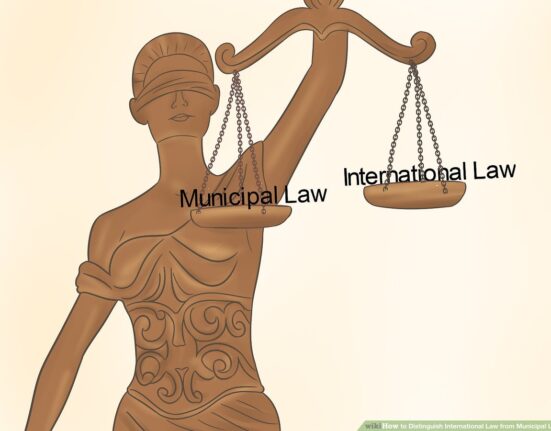Introduction
The relationship between municipal (or domestic) law and international law is complex and multifaceted. Municipal law refers to the internal legal system of a specific country or state, governing the conduct of individuals and entities within its jurisdiction. International law, on the other hand, encompasses the legal principles and rules that regulate the relationships between sovereign states and other international actors.
The relationship between municipal and international law can be characterized in the following ways:
A) Dualism
Under the dualistic approach, municipal law and international law are considered separate and distinct legal systems. They operate independently, and their rules do not automatically apply to each other. Each legal system has its own sources, subjects, and enforcement mechanisms.
B) Incorporation:
Many states incorporate international law into their domestic legal systems through various means such as legislation, treaties, or constitutional provisions. This process allows international law to become part of the domestic legal framework and be directly applicable within the state’s jurisdiction.
C) Conflict and Hierarchy:
Conflicts may arise between municipal and international law when there is a contradiction or inconsistency between their provisions. In such cases, states must navigate the conflict and determine which law prevails. Some states give priority to municipal law, while others prioritize international law, particularly when the state has voluntarily accepted international obligations.
D) Harmonization:
States often seek to harmonize their domestic laws with international obligations to ensure compliance and consistency. This can involve adapting domestic legislation, practices, or policies to align with international standards and norms.
E) Influence and Interpretation:
International law can influence the interpretation and development of municipal law. Courts and legal practitioners may refer to international legal principles, treaties, and customary practices when interpreting domestic laws or resolving legal disputes.
F) Enforcement and Compliance:
States are responsible for enforcing both municipal and international law within their territories. While international law primarily relies on state compliance and cooperation, violations of international law can sometimes result in international legal consequences, such as diplomatic protests, economic sanctions, or even military intervention.
There are 5 theories regarding the relationship between International Law and Municipal Law:
1) Monistic Theory (Monism)
- Supported by Duguit, Kelsen, and Wright.
- Law is a unified branch of knowledge, applying to individuals and entities.
- International Law and Municipal Law are interconnected.
- All laws, national or international, are made for individuals.
- Criticism: States consider their municipal laws superior to International Law.
2) Dualistic Theory (Dualism)
- Supported by Triepel and Anzilloti.
- International Law and Municipal Law are separate laws.
- Individuals are subject to Municipal Law, while States are subject to International Law.
- Municipal Law is based on the will of a State, while International Law is based on the consensus of States.
- Criticism: States are not the only subjects of International Law.
- Germany is an example of a state that follows the Dualistic Theory. In German legal doctrine, there is a clear distinction between international law (“Völkerrecht”) and domestic law (“Inlandsrecht”).
3) Specific Adoption Theory
- Supported by Positivists.
- International Law applies to a State when its Municipal Law adopts it specifically.
- Customary International Law may not require specific adoption.
- Criticism: Not applicable to customary International Law.
- India follows the Specific Adoption Theory. The Indian judiciary has consistently held that international conventions or treaties signed by India do not automatically become enforceable as part of domestic law unless they are specifically adopted through legislation by the Indian Parliament.
4) Transformation Theory
- Rules of International Law must undergo transformation to be applicable in Municipal Law.
- Not all treaties need transformation for applicability in Municipal Law.
- In the UK, international treaties or agreements do not automatically become part of domestic law. They require specific enabling legislation to be passed by the UK Parliament.
6) Delegation Theory
- International Law applies in Municipal Law according to the Constitution of a country.
- The Delegation Theory posits that the rules of international law can be applied in municipal law only in accordance with the constitution of a country.
- This theory emphasizes that the incorporation of international law into domestic law must align with the constitutional framework and processes of a state.
- Criticism: Similar to the Transformation Theory.
- The United States is an example of a state that follows the Delegation Theory. In the US, the Supremacy Clause of the Constitution establishes that treaties made under the authority of the US become “the supreme law of the land.” However, the US Constitution requires the Senate’s advice and consent for treaty ratification, and the domestic application of treaties often requires enabling legislation by Congress.
Which provision of the Constitution of India deals with International Law?
- Article 51: Promotion of international peace and security.
Indian Practice:
- Shri Krishna Sharma vs The State of West Bengal (AIR 1954 Cal. 591): Indian courts must obey Indian laws in case of conflict with International Law.
- ADM Jabalpur vs Shiva Kant Shukla (AIR 1976 SC 1207): Municipal Law prevails in case of conflict with International Law, but interpretations favor harmony.
- Gramophone Company of India Ltd. vs Birendra Bahadur Pandey (AIR 1984 SC 667): Customary International Law applied if not inconsistent with municipal laws.
- Vellore Citizens Welfare Forum vs Union of India (AIR 1996 SC 2715): Customary International Law incorporated into domestic law if not contrary to municipal laws.
- Massimiliano Latorre and Another vs Union of India (2012 Kerala HC): Municipal Law prevails over International Law in case of conflict.
A chart outlining the key differences between municipal (domestic) law and international law:
| Aspect | Municipal Law | International Law |
|---|---|---|
| Scope and Application | Governs internal affairs of a specific country or state | Governs relationships between sovereign states and international actors |
| Sources | Legislation, regulations, judicial precedents, constitutional provisions | Treaties, customary international law, general principles of law, judicial decisions |
| Subjects | Individuals, corporations, organizations, legal entities within a country’s jurisdiction | Sovereign states, international organizations, non-state actors (to some extent) |
| Enforcement | Domestic courts, law enforcement agencies, governmental institutions | Voluntary compliance of states, diplomatic negotiations, international courts/tribunals |
| Hierarchical Relationship | Municipal law is considered supreme within a country, subject to constitutional provisions | International law is considered superior to conflicting municipal law (in states that accept international obligations) |
| Centralized Authority | Decentralized within each country, multiple legal systems | No centralized enforcement, relies on state compliance and collective actions |
| Interconnectedness | Municipal law may incorporate international law, international law influences interpretation of municipal law | Municipal law may align with international obligations, international law may address domestic implementation |
![]()







Leave feedback about this